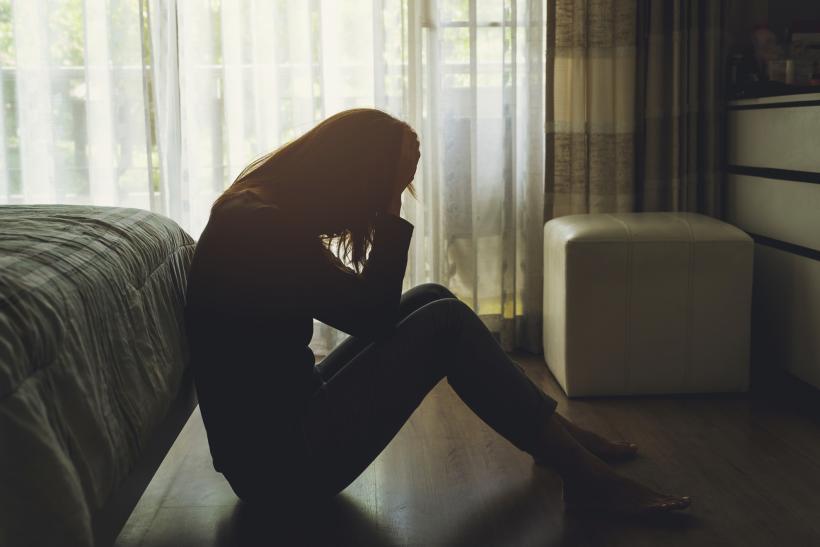
My depression is my dirty secret.
Whenever my depression starts to creep up on me, my immediate response is to deny, deny, deny. I know exactly what is happening; after a decade of coping with mental illness, you get to know the pattern intimately. The loss of connection to my own life. The inability to tap into my emotions, good or bad. The voice in my head becoming louder, more negative, more powerful. I recognize it as soon as it begins, but acknowledging it is a whole different story.
I know it’s a lie when I tell myself that I’m “simply off” or “maybe I’m just having a few bad days” or “I’m in a funk” or “I must be upset about something, but I don’t know what.”
I know what each of those experiences feels like, and they’re nothing like the deadened numbness of depression. I may have a couple days of wavering uncertainty as it settles in, but when depression hits, it’s unmistakeable.
It’s wandering around my own life, feeling like I barely have the energy to make it through to the end of each day. It’s finding no satisfaction in a day that would otherwise fill me up. The disassociation makes me cry, but the crying serves no purpose. It doesn’t make me feel better. Nothing does.
Despite knowing that I ought to speak up about my depression as soon as it descends, I am still reluctant to admit it to anyone, even myself. It feels selfish, even evil, to say it out loud. “You can’t be depressed,” I tell myself when I feel it coming on, because there is no more guilty feeling than wallowing in depression when you have a fantastic, healthy life.
I can’t help but suspect that this denial holds me hostage more than I like to admit. Denial allows my depression to grow unchecked... It likely prolongs the episodes of depression. Waiting it out is painful and unnecessary, but all too often it’s easier than admitting what’s really going on.
I know full well that this is not how depression works. I know it does not follow any set of rules, and that no amount of success and happiness will help me ward it off. Depression doesn’t care about my three beautiful children, my loving husband, my stable home and awesome job, or any of the other great strokes of privilege and good fortune that have graced me throughout my life.
But I do care. I care a lot.
It kills me when I can’t spend each day bathed in gratitude for everything I’ve been given and everything I’ve worked so hard for. I love my life deeply, and I hate that depression can steal away that love at a moment’s notice. I feel so guilty for not appreciating all I have that I find it easier to keep my depression a secret than to tell anyone else I don’t feel overwhelmed with contentment as I go through the motions of my day.
You Might Also Like: The Hardest Part Of My Depression Is Knowing It Will Come Back
I become so consumed with the "but look at how good your life is" trope that I beat myself up instead of focusing on the small self-care steps I should be taking to see me through to the other side.
I tell myself to come up with a plan to take care of myself. Eat good food. Get more sleep. Talk to someone. Meditate. But there’s another, more persistent voice that drowns out any modicum of sensible advice. The voice inside my head won’t stop telling me how selfish I am, how grotesque it is that I don’t feel any fondness for my life. It tells me I don’t deserve to treat myself well, I already have it great, why should I reward myself for being ungrateful?
The guilt that guides my internal dialogue has often prevented me from seeking help when I'm in the grips of depression. Especially because I am still functioning to some degree — still feeding my kids and showing up for work and sleeping only a little bit more than normal and aching only a little bit here and there — it becomes easier to deny.
Yet I can’t help but suspect that this denial holds me hostage more than I like to admit. Denial allows my depression to grow unchecked. Denial means I don’t make my mental health or self-care a priority. It stops me from communicating and connecting with the people I value most. It likely prolongs the episodes of depression because I keep it all bottled up. Waiting it out is painful and unnecessary, but all too often it’s easier than admitting what’s really going on.
There is a wave of relief when my depression eventually subsides. Sometimes it’s after a few weeks. Sometimes months. But there is also a sense of dread. It is likely that someday it will come back. The process will start all over again. I only hope when that day comes, I’ll have found the strength to admit it to myself — to stop treating my depression like a dirty secret and embrace it as a part of my life.
My beautiful life; my depressed life. They are one in the same.
Related:
- Depression And My Appointment With A Hole
- "Black Women Don't Get Depressed"
- 10 Ways My Depression Actually Improved My Life







